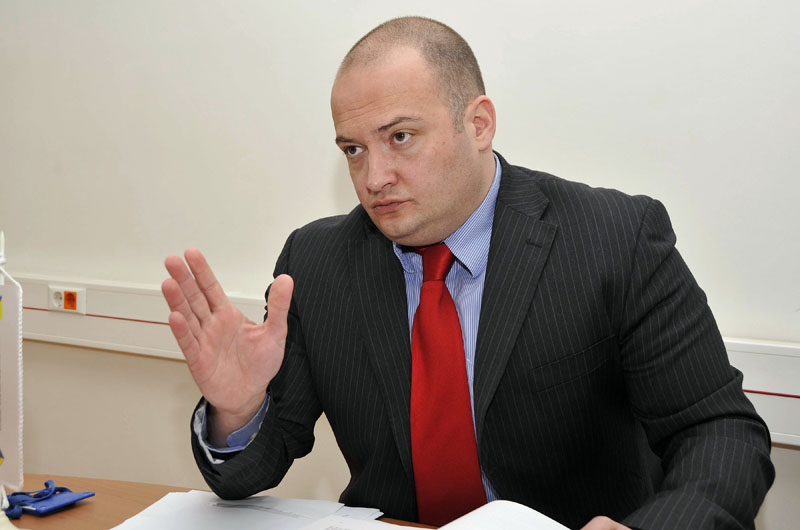Last year, the Office of Disciplinary Counsel of the High Judicial and Prosecutorial Council (HJPC) of Bosnia and Herzegovina received about 100 complaints on monthly basis and these dealt with the work of judges and prosecutors, so 28 disciplinary proceedings were initiated against 31 judges and prosecutors, which is the highest number since the establishment of the Office.
This is what Arben Murtezić, HJPC Chief Disciplinary Prosecutor, said in an interview for "Dnevni Avaz" in which he also presented data from the 2015 Annual Work Report which was considered by the members of the HJPC yesterday. Speaking of proceedings, he said that they were also initiated against the highest-ranking persons in 2015, specifically against the two presidents of the court, one judge of the Supreme Court of the FBiH and three prosecutors from the BiH Prosecutor’s Office.
Official duty
What kind of sanctions were imposed against those carriers of judicial functions who were found to have disciplinary liability?
- Earlier, the European Commission has objected to the level of sanctions, so in 2015, we tightened the policy regarding sanctions. About 60 percent of these are fines, including measures for dismissal. In addition to one measure of dismissal, we had three resignations during the disciplinary proceedings.
What do the complaints against judges and prosecutors which you received refer to most often?
- The most common are complaints regarding judicial or prosecutorial decisions. However, we are not a body dealing with appeals that can have influence on the judicial or prosecutorial decisions. Also, the subjects of the complaints also involve the length of the court and prosecution proceedings. This is in our domain of action, so we worked quite a lot on these issues, especially in extreme situations, and that which plagues every judicial system is the application of the statute of limitations for criminal prosecution or the execution of criminal sanctions. In this regard, the Council has been collecting all the information about such cases for years and almost every third complaint we received in 2015, refers to this type of situations.
Who submits these complaints?
- In almost 50 percent of cases, these are the parties who are dissatisfied with a judicial and prosecutorial decision. You can rarely have two satisfied parties leaving the court, meaning that one party is usually dissatisfied or even both parties. Quite a few complaints were sent by other agencies, intelligence and security ones, SIPA... Also, we are among the rare in the region in that we open complaints ex officio. For many of these cases I can neither confirm, nor say publicly that much of what is seen in the media is actually registered as a case with us and it is being investigated. Some of our most interesting cases were handled on the basis of media reports. We regularly monitor this and, in that context, we consider investigative journalism to be one of the best associates of the judiciary, regardless of the fact that something can be understood as a pressure on the judiciary. I think that public perception is generally very significant.
Close monitoring
Speaking of relations between the media and judicial institutions, how do you comment on the fact that the media published transcripts of some parts of the intercepted conversations involving the SBB leader Fahrudin Radončić, even prior to their presentation at the hearing before the Court of BiH. The BiH Prosecutor’s Office said that it would carry out checks of all stakeholders in the proceedings; does it mean that the ODC will eventually take some steps as well?
- Not only in the present case, situations like these can largely constitute a criminal offense, which is not in our direct jurisdiction, but they can possibly constitute a disciplinary offense as well. I cannot mention directly the cases we are working on right now as there is an obligation of confidentiality, but I can assure you that we carefully monitor such information and act accordingly.
Does it mean that you are acting on it in this particular case as well?
- I cannot confirm it as far as the present case is concerned, but this type of cases is something we register and work on.
Lawyer Vasvija Vidović complained that she was prevented from doing her job because she was summoned to appear as a witness in the proceedings against Fahrudin Radončić, meaning that she is excluded from his defense team. Through the same act, Vidović was prevented from acting as a defense attorney for the defendant Bilsena Šahman. Can you comment on this case and tell us if the ODC has the authority to act in this case?
- I cannot comment on that, but lawyer Vidović is familiar with our responsibilities and she can contact us.
We must not close our eyes to what is in the public interest
- It is our intention to act in more proactive manner in 2016, without having to wait for complaints. Cases of great public interest require particular attention and we cannot close our eyes to what appears in the media, and, therefore, we will do our best to focus our attention on that which is of particular public interest in the coming period - says Murtezić.
